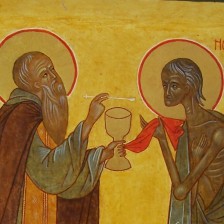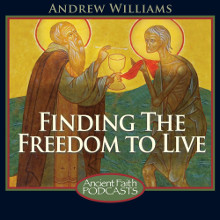
Why freedom is essential to repentance.
Jesus said “Everyone who practices sin is the slave of sin!” (Jn 8:34). This is true of all sin. We have seen in our extended discussion of pornography and addiction how easy it is to become a slave of sexual sin, and specifically how that slavery eats away at our freedom, and at the same time increasingly degrades and destroys the likeness of God in us — though the image of God in which we are made is never destroyed because so long as we live, we live only through God’s dynamic, life-sustaining power active in us.
Many of the ascetic fathers talk about this slavery to sin, and how we seek freedom in Christ. St Anthony the Great said, “A man is free if he is not a slave to sensual pleasures, but through good judgment and self-restraint masters the body and with true gratitude is satisfied with what God gives him, even if it is quite scanty. If the soul and the intellect [nous] that enjoys the love of God are in harmony, the whole body is peaceful even against its wishes.”
Freedom and happiness of soul consist in purity and detachment from transitory things -- St Anthony Share on X
He also pointed out that freedom is not something that can be provided from outside, nor something that can be attained by power, but is something that is developed inside ourselves through inner communion with God in Christ. He said, “Regard as free not those whose status makes them outwardly free, but those who are free in their character and conduct. For we should not call men in authority truly free when they are wicked or dissolute, since they are slaves to worldly passions. Freedom and happiness of soul consist in genuine purity and detachment from transitory things.”
St Paul also emphasizes this point that true freedom is found only in communion with Christ — that is, in receiving Christ into ourselves, in putting on Christ as our garment. This is the way we can begin living in harmony with the image of God in which we are made. This is how we start finding the freedom to live in the image of God.
He wrote, “You have put off the old self with his doings and you have put on the new self who is being renewed in knowledge according to the image of his Creator” (Col. 3:9-10).
We know from experience sexual sin is slavery. We see freedom on offer through union with Christ. Share on XFor those of us who have struggled and continue to struggle with sexual sin and temptations to sexual sin, we have experienced just how that sin is slavery, and hopefully we have also at least had glimpses of the freedom that Christ offers through union with him.
But I want to look at this picture now from the other side. What about those of us who do not consider that we have a particular problem with sexual sin. Of course, we all have the odd temptation, but there are many of us who habitually stand strong and yet have much sympathy for those who find this so difficult. We want to find ways to help them find strength in their struggles. How do we help them?
In the early 20th century, a Roman Catholic, the Baron von Hugel, an Austrian Christian apologist, wrote about a nun who was deeply concerned for one of her former pupils from the convent school. After leaving the school, this young woman had become a mistress to a wealthy man in town. The nun knew she could not argue her protégée out of her decisions about the life she was leading, whether by appealing to religion, or to conscience, or even to her own good in the long term.
This nun, in other words, was in exactly the situation I outlined above. The situation that many of us may find ourselves in. Someone we care about is living a life that we know to be at the very least spiritually unhealthy and dangerous. We want to help them get out of this lifestyle. What do we do, when argument makes no difference? When we pray, and yet nothing seems to change? When we see the person we care about slipping away from us into this other life that is so far from Christ, so far from everything they have been taught in the Church and have previously professed?
Well, this nun decided that there was one more path she could take. A self-sacrificial path that she, the nun, could take out of love for this young woman. A way to make her friend feel that the lifestyle she had fallen into was wrong. So she wrote to her, saying that she knew that her young friend cared for her, and wanted her to live to a ripe old age. Well, she wanted to let her know that for every day she continued to live in this immoral lifestyle, she, the nun, would scourge herself until she stood in a pool of her own blood. That she had already started to put this plan into action. That nothing would stop her until she had it confirmed that her young friend had changed her course and left her sexual immorality behind.
After a few days, the nun received a letter from her young friend, telling her that she had succeeded in her attempt, that she had broken off the relationship.
But what, in fact, had she achieved?
Everyone who practices sin is the slave of sin! Jn 8:34 Share on X
At the beginning, I quoted the Lord saying “Everyone who practices sin is the slave of sin!” (Jn 8:34). This appears in the Gospel of John, chapter 8 . A little earlier in the same chapter, there is the story of the woman caught in adultery (Jn 8:3-11). Like the young friend of the nun, she had somehow fallen into sexual immorality. The Lord cared about her deeply, just as the nun did about her young friend. Although her young friend probably did not face a stoning, like the woman in the Gospel account, she certainly faced social disapproval and other worldly condemnations of her behaviour.
But Jesus did something different. He challenged the accusers to look at their own hearts, and when they did so, they found perhaps that they were not in so strong a position in comparison to the woman caught in adultery as they had thought they were. So they slipped away quietly. And Jesus said, “Where are they? Did no one condemn you?” adding, “Neither do I condemn you. Go your way! And from now on, sin no more” (Jn 8:11).
No condemnation, no emotional blackmail, no sermon, no talk of consequences, no bewailing lost innocence, no talk of falling away. None of this. Instead, three very short sentences, which I’ll consider briefly in reverse order.
“From now on, sin no more!” Jesus does issue a strong and direct call to repentance. As St Isaac the Syrian says, “This life was given you for repentance. Do not waste it in vain pursuit.” There is no more vain pursuit than adultery and sexual immorality, which takes the superficial form and pleasure — the image — but cuts it off from its root, its archetype, the deeper reality which it is supposed to reveal — that is, true union and communion.
Repentance can begin at any moment Share on X“Go your way!” Go your way. Jesus affirms here the woman’s freedom. She does have a choice. The pressures may be great, there may be all kinds of very good reasons with which we could sympathize which led her into this situation. But nevertheless, she does have a choice. She has freedom… We all have freedom. We can act in such a way that over time, our ability to exercise our freedom is decreased and damaged, but as they say, while there is life, there is hope. Repentance can begin at any moment.
“Neither do I condemn you!” Condemnation will not inspire repentance. God is merciful and slow to anger. He does not force us to do good, but waits for us in our freedom to choose the path of love and righteousness.
So here is where the nun went wrong. She loved the young woman deeply and wanted all good for her, but in so doing, she forced the woman to do the right thing. And by forcing her, she prevented the young woman from choosing to do the right thing. She took away her freedom, and in so doing, took away her ability to love. She took away her ability to repent. Instead of encouraging the young woman to submit herself to Christ, she forced her friend to submit to herself, to her own threats, her own emotional blackmail. She took away the possibility of the great joy that could have been found by one freely following Him who simply said to her, “Go your way. And… sin no more!”
There is no repentance without love and freedom Share on X
So whether we struggle with sexual sin ourselves, or whether we want to help those of our acquaintance who have to some degree formed their lives in a context of sexual sin, let us be aware that there is no repentance without love and freedom. Although there are times when we use force on ourselves (the force of the ascetic path, for example, against our desires for bodily pleasure), this is a force born of freedom and love: we choose to exercise restraint because we desire to conform ourselves to Christ’s life and live in union with him. We need also to respect this in everyone around us. We cannot force them to love nor force them to exercise their freedom. What we can do is to inspire them with the love of Christ, so that they will choose to do those things of themselves, with God’s help and ours.


You must be logged in to post a comment.